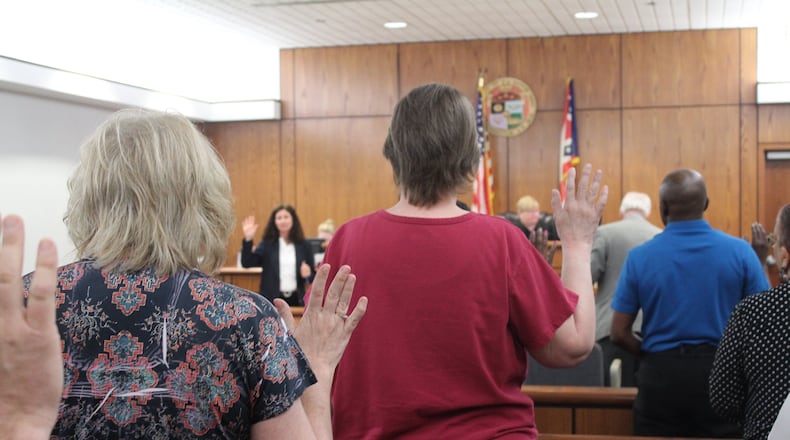Overwhelmingly, eviction filings are granted in Dayton housing court. Dayton ranked 26 out of the largest 100 U.S. cities for its eviction rate in 2016, according to data from municipal court and the Eviction Lab at Princeton University.
MORE: Neighbors hope evictions bring peace to Dayton duplex
But some local groups are working to study the community effects of evictions and to educate the public about their role in housing insecurity, neighborhood stability and poverty cycles.
Local nonprofit law firm Advocates for Basic Legal Equality (ABLE) provides low-income people with legal counsel and assistance. ABLE has been awarded nearly $100,000 to pay for eviction defense services in Dayton to help tenants in court who otherwise would have to go it alone.
“Not every eviction that is filed is for a legitimate basis,” said Matthew Currie, senior attorney for ABLE. “But tenants without an attorney have a difficult time explaining to the magistrate or judge that they actually have a legal defense.”
Last year, there were 2,632 evictions filed in Dayton Municipal Court.
MORE: Why these new residents decided to live in downtown Dayton
Since 2012, the court has recorded 15,911 eviction filings and granted more than 12,000 evictions, court data show.
Eviction cases can be expensive, time-consuming and frustrating for landlords.
But they can be life-altering in many ways for tenants who get the boot, some researchers say.
Evictions can hurt neighborhood stability and are tied to poverty and homelessness.
Housing instability is associated with worse educational outcomes for children and can harm families' access to basic necessities, like food and clothing, research suggests.
Eviction also can haunt people when they seek housing in the future.
MORE: Downtown Dayton parking meters: Groups tackle image problems
Private landlords screen tenants, and many will not rent to people with prior evictions on their records. Evictions also can hurt people’s access to subsidized housing.
“Once you get evicted, your opportunity for housing decreases,” and Amaha Sellassie, a sociology instructor at Sinclair College whose class collected and analyzed eviction data in Dayton.
After even just one eviction, people may only be able to get lower-quality housing in less desirable areas, Sellassie said.
People may find themselves stuck in sub-par homes with bad landlords because they are blacklisted by a large part of the rental market.
But having legal counsel in housing cases increases a tenant’s chances of avoiding eviction or reaching an agreeable settlement for both tenant and landlord, Currie said.
Tenants many times have legitimate defenses against eviction complaints, but they may not be aware of their rights under the law or may not be able to articulate the pertinent facts in court without a legal expert, Currie said.
“It clearly puts the tenant in a position where they are going to have a tough time succeeding,” Currie said.
MORE: Huber Heights woman whose daughter died in house fire facing evictions
In 2017, landlords had attorneys in about 80 percent of eviction filing cases in Dayton, court data obtained by this newspaper indicates. Less than 2 percent of tenants showed up to their hearings with legal counsel, the data show.
ABLE wants to change that.
The group has been awarded a $94,890 grant from the Ohio Legal Assistance Foundation to help pay for three-quarters of an attorney’s salary to handle eviction cases in Dayton Municipal Court.
The hope is to find another partner to help fully fund the position.
The funding will help with an estimated 150 to 250 eviction cases in Dayton Municipal Court during the pilot-period phase.
Another goal is to make the pilot project a permanent program.
The project is in collaboration with the University of Dayton School of Law and Sinclair College, with goals to leverage resources and measure impact.
ABLE wants to help people like Lisa Van Epps remain in their homes.
In October, Van Epps’ landlord issued her a notice to leave the premises after her roommate passed away. The landlord filed for eviction in November.
Van Epps, 53, who is disabled, had lived in the subsidized apartment in Fairborn for just as long as her roommate.
MORE: Locations of Dayton’s affordable housing criticized
But the landlord said Van Epps was designated as a live-in aide who had no right to remain since the apartment was in her roommate’s name.
Van Epps said she connected with ABLE, hoping to avoid ending up on the street.
“I have no family, no income, and I have been in a homeless shelter before, and I really didn’t want to return,” Van Epps said.
ABLE senior attorney Debra Lavey did some research and determined that Van Epps was incorrectly listed as an aide when in reality she was a household member.
In subsidized housing, family members do not have to be related by blood or marriage.
The landlord eventually agreed to dismiss the eviction and put the subsidy in Van Epps’ name.
“It’s safe to say that this would have been an uphill battle for Ms. Van Epps,” Lavey said.
Lavey said even tenants who do a good job explaining a legal defense in court may find out that their arguments do not carry the same weight as an attorney’s would.
Van Epps said she knew nothing about subsidized housing rules and did not understand her rights as a tenant.
“If it wasn’t for her (Lavey), I wouldn’t have known any of this and any outcome would have been the shelter,” she said.
About the Author

